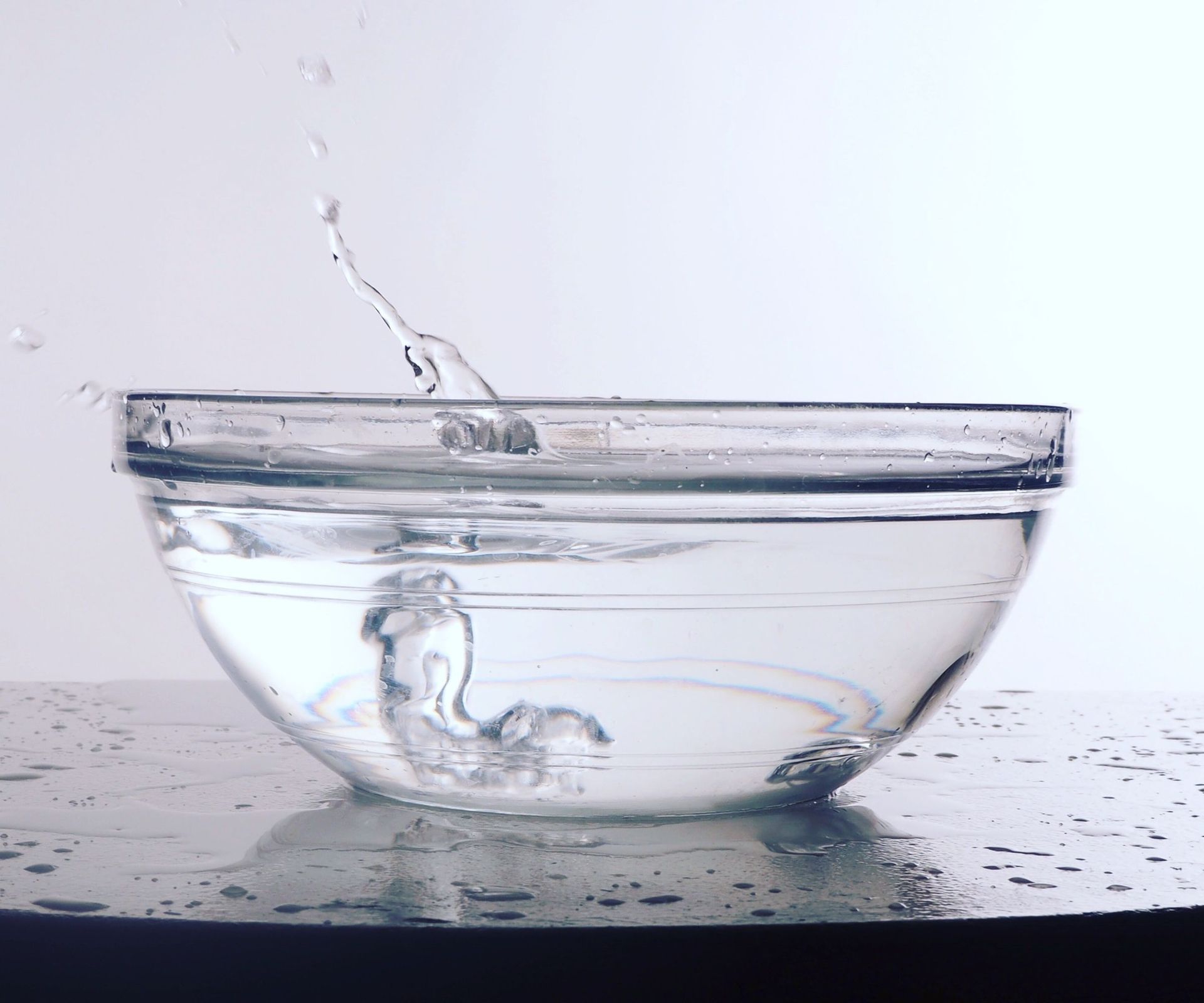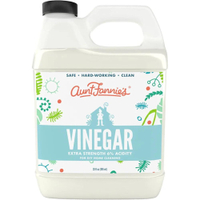Why you should keep a bowl of vinegar next to your stove
Tired of strange smells lingering in your kitchen after cooking? A simple bowl of vinegar could be the perfect solution for you
- (opens in new tab)
- (opens in new tab)
- (opens in new tab)
- Sign up to our newsletter Newsletter


We are constantly amazed by the uses of vinegar in our homes, and getting rid of bad smells is just one of many ways white vinegar is a home savior in our books.
While home cooking can make a home smell incredible, some foods (like fish) are simply unpleasant to have to linger for days on end. In a quest to make a home smell nice, vinegar can be used to neutralize even the toughest of bad odors and make way for fresher home fragrances – and you don't even have to clean your kitchen with it for it to work.
We break down why a bowl of vinegar next to your stove makes such a difference to cooking odors.
Why you should keep a bowl of vinegar next to your stove

Keeping a bowl of vinegar next to your stove is not to do with being able to make salad dressing in under two minutes, but rather to help neutralize bad cooking odors as they arise – and before they have the chance to hang around.
There are a few ways you can use distilled white vinegar to get rid of smells, but the easiest is to place a small bowl right beside the stove – it really involves no effort at all. 'Leave a bowl of vinegar out overnight,’ advises Saskia Gregson-Williams, cookbook author and founder of Naturally Sassy (opens in new tab). ‘In the morning, the vinegar will have absorbed all the unsavory smells and your kitchen will be as fresh as a daisy.’
White vinegar is made of acetic acid which perfectly neutralizes the alkaline scents that we call bad odors. You can add white vinegar to laundry to help deodorize clothes too.
6% Distilled White Cleaning Vinegar – $11.99 at Amazon (opens in new tab)
This specially formulated white vinegar with cleaning strength at 6% acidity lifts grime and breaks down grease, mineral deposits, lime scale, and built-up film for a clean space with no residue left behind and no rinsing required.
If you are wanting to tackle bad smells as you cook to prevent them from permeating your kitchen surfaces, then leaving a bowl of vinegar directly next to your stove as you cook can help to mitigate some of the strongest smells as they arise. When using this method, you may have to change the vinegar out every few days to maintain its effectiveness. So it may cost you more over the long run than only treating smells that aren’t dissipating on their own.
The Complete Book of Clean: Tips & Techniques for Your Home – $14.99 at Amazon (opens in new tab)
The Complete Book of Home Cleaning is a complete, eco-friendly guide to cleaning your home. From establishing routines, making schedules, and DIYing green cleaning solutions to help keep every area of your home neat, safe, and spotless.
Despite being a useful hack for everyday cooking, some acrid smells such as from burnt food can be harder to get rid of in kitchens, however, meaning your little bowl of vinegar can’t manage the task on its own. ‘Give your kitchen a steamy makeover by boiling a pot of water mixed with equal parts vinegar,’ Saskia advises. ‘The steam will lift away any pesky cooking smells that have been hanging around.’
If the smell in your kitchen persists, then a little bit of elbow grease may be required, Saskia says. ‘Fill a spray bottle with two cups of water and one to two teaspoons of vinegar and spritz it around the kitchen – it's like a breath of fresh air in a bottle!’ While you can spray undiluted vinegar around the kitchen for particularly potent smells, this may just replace one scent with the pungent essence of vinegar, so adding some water (or even an essential oil) can make it a little less potent.
The good news is this will also help clean a kitchen at the same time – just make sure to check which things you can clean with vinegar first to prevent causing any damage to paintwork or surfaces.
‘Remember to also keep any windows and external doors open to allow fresh air to circulate and dissipate any odors, especially when cooking pungent foods,’ Saskia adds. ‘With these tips, your kitchen will be smelling sweet in no time.’
How long will a bowl of vinegar absorb odors for?
You can leave a bowl of vinegar out in the kitchen for several hours and it will help to get rid of smells. As social media-famous cleaning expert Babs (opens in new tab) explains, if you're preparing a meal, particularly fish or a curry that releases strong smells that you don't want getting into the fibers of your couch, for instance, then pouring a bowl of distilled white vinegar from when you start cooking will help absorb odors.
Leave it overnight and if you can still smell the odors in the morning, she recommends boiling some lemon slices. If you're finding the smells stick around, try replacing the bowl more frequently.
Does heating vinegar make it clean better?
White distilled vinegar is not only a cooking staple but is one of the most commonly used, natural cleaning products out there. It will disinfect surfaces, from your kitchen countertop and appliances to bathroom tiles. It will also help to get rid of mold, simply apply with a spray bottle and microfiber cloth, at Amazon (opens in new tab).
Some oven cleaning hacks suggest that heating vinegar and creating steam will make it remove burnt-on stains, and grease more easily. The same goes for cleaning your microwave or hard water spots on your shower screen. But, as we mentioned, it's safer to do so when it has been diluted with water. We'd recommend mixing equal parts vinegar and water to be on the safe side. After all, although it's natural, we're still dealing with a strong acid.
Why does white vinegar remove odors?
White vinegar is primarily made up of acetic acid, a compound that reacts with and neutralizes alkaline smells that we recognize as bad odors. When used as either a spray to clean down surfaces, or put in bowls around a smelly space, the vinegar absorbs the smell over time
Does boiling vinegar get rid of smoke smell?
If you have recently moved house and are struggling to shift the smell of smoke left by the previous owners, vinegar may an easy and cost-effective solution. Boiling vinegar can help to get rid of the lingering smell.
Just make sure to dilute it with water first to prevent pure evaporated acid from burning your eyes and throat. An alternative way to deal with the smoke smell is to leave bowls of vinegar sitting around the space to absorb the smell over several days. It also helps to wipe down surfaces such as doors, tables, and walls with vinegar to help remove the smell more quickly.
How can I deodorize a room quickly?
Ventilation will help get rid of odors fast so open the windows first. It goes without saying but identify the smell, for example, if it's the kitchen trash can then you can sprinkle baking soda, which is a powerful deodorizer. Otherwise, clean the surfaces, from the floors to the upholstery and try a commercial deodorizing spray, $10 at Walmart (opens in new tab).

Chiana is a junior writer for Homes & Gardens having joined Future plc as a new graduate in 2022 after achieving a 1st class degree in Literature at university. She first became interested in design as a child after spending her summers helping her parents redecorate her childhood home. As a long-time reader of Future’s homes titles, Chiana is constantly finding new inspiration at work as she focuses on emerging trends, how-to’s, and news pieces.
-
-
 Robert Pattinson just bought a Spanish Colonial-style home – with an interior designer past
Robert Pattinson just bought a Spanish Colonial-style home – with an interior designer past'The Batman's' Robert Pattinson and Suki Waterhouse purchased the Jeff Lewis-designed Hollywood Hills estate for $5.3 million
By Megan Slack • Published
-
 7 expert-approved methods to remove candle wax from carpet
7 expert-approved methods to remove candle wax from carpetCleaning professionals share their tips on how to remove candle wax from carpet
By Millie Hurst • Published



